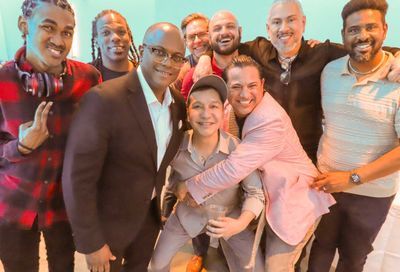Rounding-Up Votes
With the 90-day clock ticking down, Maryland's advocates say they are leaving 'no stone unturned' in the effort to pass marriage equality
The hunt for votes in favor of marriage equality is on in Annapolis.
With the start of the Maryland General Assembly’s 90-day legislative session Jan. 11, advocates are actively lobbying Free State legislators to pass a marriage-equality bill after a similar bill died in the General Assembly last year.
 Del. Heather Mizeur (D-Montgomery Co.), one of eight LGBT legislators in the General Assembly and a strong proponent of the measure, tells Metro Weekly that supporters of marriage equality have ”pledged not to leave any stone unturned in passing this bill.”
Del. Heather Mizeur (D-Montgomery Co.), one of eight LGBT legislators in the General Assembly and a strong proponent of the measure, tells Metro Weekly that supporters of marriage equality have ”pledged not to leave any stone unturned in passing this bill.”
In 2011, a marriage-equality bill passed the State Senate on a 25-22 vote, but was essentially killed in the House of Delegates after Judiciary Chairman Del. Joseph Vallario Jr. (D-Calvert, Prince George’s counties) recommitted the bill to committee for further discussion.
In addition, several House lawmakers who had originally expressed support for marriage equality wavered on their position or pulled their support for the bill, casting doubt that supporters had the votes to pass it amid a very public and concerted campaign by opponents, including members of the state’s religious community, to prevent the bill from moving forward.
Kevin Nix, the communications director for Marylanders for Marriage Equality, a coalition of various groups pushing for civil marriage and equal treatment under the law, says, ”We are working as quickly as we can to get the votes. At the end of the day, the goal is to get the bill passed.”
Some proponents of marriage equality began sounding alarms after Senate President Thomas V. Mike Miller (D-Calvert, Prince George’s counties) made comments perceived by activists as anti-gay during an appearance with House Speaker Michael Busch (D-Anne Arundel Co.) on WEAA radio’s The Marc Steiner Show Jan. 11. While Busch called marriage equality a ”civil rights issue,” Miller said he thought gay marriage constituted an ”attack on the family, an attack on traditional families.”
Miller said he would like certain religious exemptions ”carved into” the bill if it were to pass, but promised to bring it to a vote, even though he would vote against it. Miller also said that if marriage equality was passed, he expected to see the measure go to a referendum and be defeated by a mix of evangelical, Catholic and African-American voters at the polls.
But openly gay Sen. Rich Madaleno (D-Montgomery Co.) says that when he spoke to Miller about his remarks after his appearance on the show, he didn’t think that the Senate president intended for his remarks to come across as inflammatory.
Carrie Evans, executive director for Equality Maryland, one of the organizations involved in the Marylanders for Marriage Equality coalition, says much of last year’s wrangling in the House of Delegates was complicated by the fact that there were many freshmen members with whom advocates lacked working relationships. She says that this year, the LGBT caucus has been trying to reach out to those newer members and rally them to vote for the bill.
As a member of the Legislature and the LGBT caucus, Madaleno says he expects both chambers to pass the bill this year, especially since many House members have gotten more experience dealing with angry constituents.
”Of the 47 senators, 46 had prior elective experience,” says Madaleno. ”They knew what it’s like to receive threats and warnings in the face of hard stances. The House members were newer, inexperienced, and had to take their first vote on an emotional issue seven weeks into their first legislative session.”
In order to broaden support for the measure, Evans says that the Marylanders for Marriage Equality Coalition has ramped up outreach efforts to moderate Republicans and has encouraged constituents of those Republicans to call their representatives and express support for the bill.
”This needs to be a bipartisan effort,” Evans says. ”It’s not a partisan issue. It’s about protecting families.”
Evans says advocates are also trying to lay the groundwork for not only passing the bill through the Legislature, but defending the law at the ballot box if opponents are successful in forcing a referendum onto the 2012 ballot.
Evans adds that supporters of marriage equality are fully aware that a fight against a referendum to repeal a marriage-equality law would be intense and expensive, due to expected high voter turnout due to the presidential election and other ballot initiatives, as well as the price of advertisements and educational campaigns.
Both Evans and Nix praise Gov. Martin O’Malley (D) and Lt. Gov. Anthony Brown (D) for their support of the measure. O’Malley has said passing a marriage-equality bill is among his top priorities and has vowed to actively lobby legislators on behalf of the bill. Brown has appeared in a video for Marylanders for Marriage Equality and has made multiple media appearances where he has touted his support for same-sex marriage.
Nix says that he believes O’Malley making the bill a priority will help its chances of passing.
Madaleno also says he’s confident that the governor’s support for the bill will encourage members to vote for it.
”This governor has a very good batting average,” says Madaleno.
In considering a possible referendum, Madaleno says the campaign will be tough, but he believes voters will ultimately support marriage equality. He backs that up by saying he has seen a significant shift in support for the issue among Marylanders, particularly among his constituents in liberal-leaning Montgomery County, over the past few years.
”Five years ago, it was sort of a boutique position,” he says. ”Now, with more LGBT people out, and people gaining more exposure to gay friends and neighbors, they feel differently about the issue. We’ve crossed a threshold that’s significant, and I think that’s carried over into other areas of the state as well.”
Support Metro Weekly’s Journalism
These are challenging times for news organizations. And yet it’s crucial we stay active and provide vital resources and information to both our local readers and the world. So won’t you please take a moment and consider supporting Metro Weekly with a membership? For as little as $5 a month, you can help ensure Metro Weekly magazine and MetroWeekly.com remain free, viable resources as we provide the best, most diverse, culturally-resonant LGBTQ coverage in both the D.C. region and around the world. Memberships come with exclusive perks and discounts, your own personal digital delivery of each week’s magazine (and an archive), access to our Member's Lounge when it launches this fall, and exclusive members-only items like Metro Weekly Membership Mugs and Tote Bags! Check out all our membership levels here and please join us today!



















